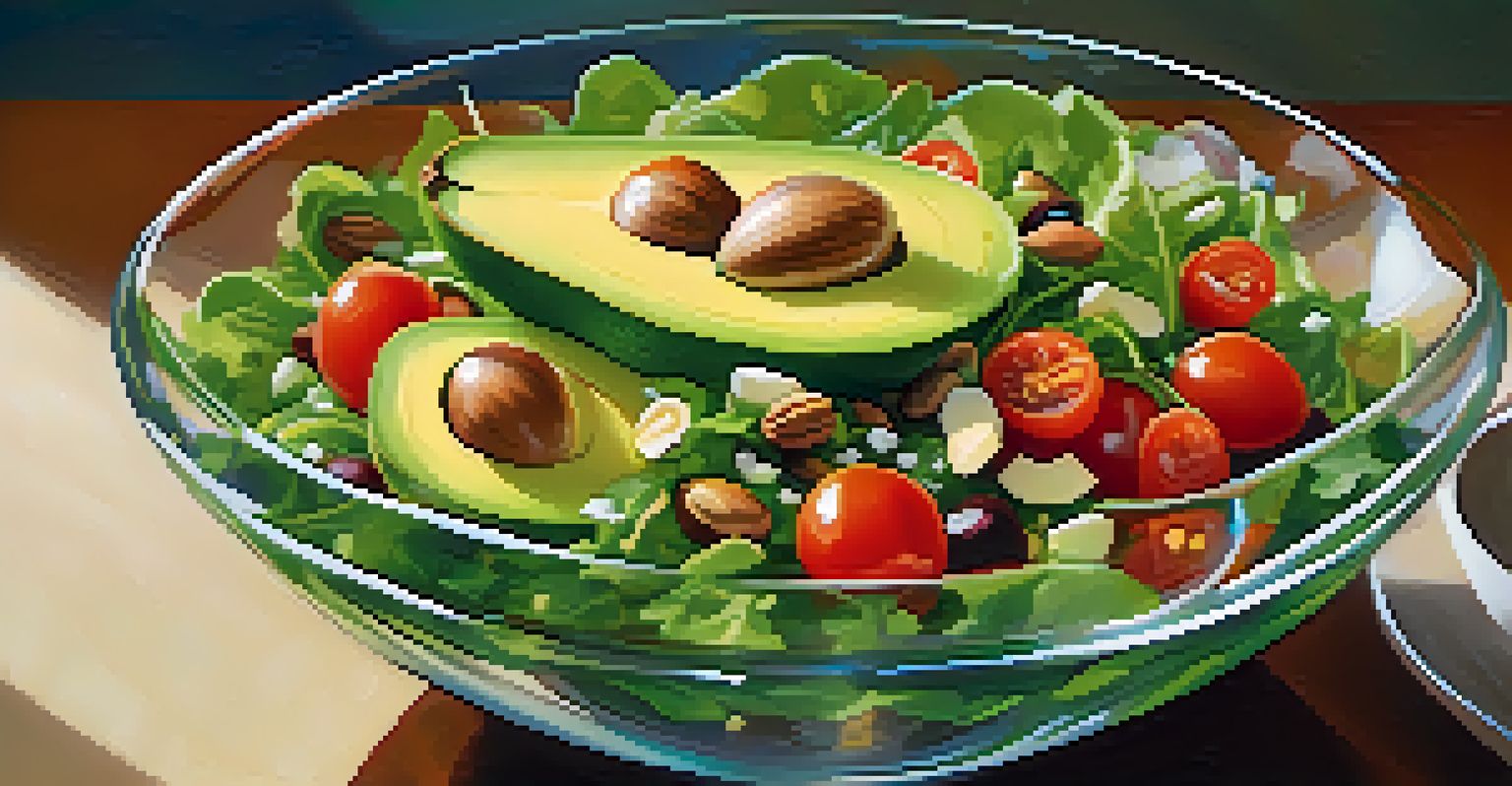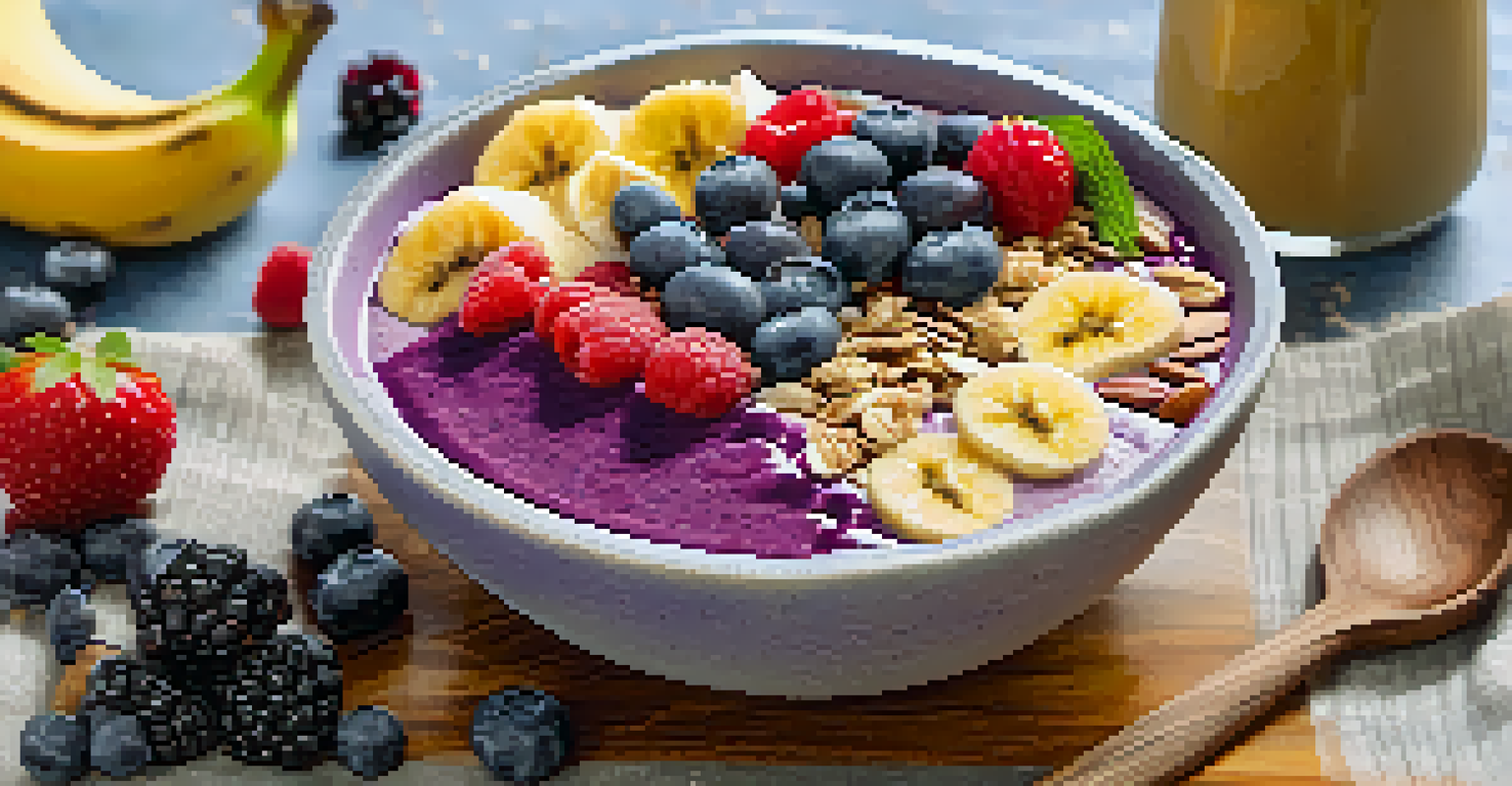Antioxidants in Raw Foods: A Scientific Perspective

What Are Antioxidants and Why Are They Important?
Antioxidants are compounds that help neutralize harmful free radicals in our body. These free radicals can cause oxidative stress, leading to cell damage and various health issues, including chronic diseases. Consuming antioxidants is essential for maintaining good health and preventing diseases, making them a cornerstone of a balanced diet.
Antioxidants are the body's defense system, neutralizing harmful free radicals and helping to prevent diseases.
The importance of antioxidants cannot be overstated. They play a crucial role in supporting our immune system, reducing inflammation, and even slowing down the aging process. By incorporating antioxidant-rich foods into your diet, you can enhance your overall well-being and possibly extend your lifespan.
Fruits and vegetables, particularly those that are raw, are excellent sources of antioxidants. By eating these foods in their natural state, you maximize their nutritional value and ensure that you receive the full spectrum of health benefits they offer.
Types of Antioxidants Found in Raw Foods
There are several types of antioxidants, each with unique properties and benefits. The most common types include vitamins C and E, beta-carotene, and flavonoids. These antioxidants work in different ways to protect the body from oxidative stress and support various bodily functions.

Vitamin C, found in citrus fruits and leafy greens, is known for its immune-boosting properties and its role in collagen production. Similarly, vitamin E, found in nuts and seeds, helps protect cell membranes from damage. Beta-carotene, abundant in carrots and sweet potatoes, converts to vitamin A in the body, which is vital for vision and skin health.
Antioxidants Combat Free Radicals
Antioxidants neutralize harmful free radicals, helping to prevent oxidative stress and various health issues.
Flavonoids, a group of antioxidants found in fruits, vegetables, and even tea, have been shown to reduce inflammation and lower the risk of heart disease. By consuming a variety of raw foods, you can ensure that you obtain a wide range of these beneficial compounds.
How Raw Foods Preserve Antioxidant Levels
One of the key benefits of eating raw foods is that they often retain higher antioxidant levels compared to cooked foods. Cooking can break down these sensitive compounds, reducing their effectiveness. Therefore, consuming fruits and vegetables in their raw state can provide more health benefits.
Let food be thy medicine, and medicine be thy food.
For example, steaming vegetables can help preserve some nutrients, but it still often results in a loss of antioxidants compared to eating them raw. This is why many health enthusiasts advocate for raw diets, emphasizing the importance of freshness and minimal processing.
Incorporating raw foods into your meals not only boosts your antioxidant intake but also enhances your overall diet quality. Fresh salads, smoothies, and raw snacks are delicious ways to enjoy the full spectrum of nutrients that raw foods have to offer.
The Health Benefits of Antioxidants in Raw Foods
Eating raw foods rich in antioxidants is associated with numerous health benefits. Research suggests that a diet high in antioxidants can help reduce the risk of chronic diseases, such as heart disease, diabetes, and certain cancers. The protective effects of these compounds contribute to better overall health.
In addition to disease prevention, antioxidants can also promote healthy skin. They combat free radicals that contribute to skin aging, helping to maintain a youthful appearance. This is why many beauty products highlight antioxidants as key ingredients.
Raw Foods Retain More Nutrients
Eating raw fruits and vegetables preserves higher levels of antioxidants compared to cooked foods.
Moreover, antioxidants can enhance brain health by protecting against neurodegenerative diseases. Consuming a diet rich in raw fruits and vegetables may improve cognitive function and reduce the risk of conditions like Alzheimer's disease.
Challenges of a Raw Food Diet
While a raw food diet offers many benefits, it also comes with challenges. One of the main concerns is the potential for nutrient deficiencies, particularly in vitamins and minerals that are more readily available in cooked foods, such as iron and calcium. It's essential to plan meals carefully to ensure a balanced intake.
Another challenge is the digestibility of certain raw foods. Some people may find it harder to digest raw beans, grains, or cruciferous vegetables, which can lead to discomfort. Cooking can make these foods more palatable and easier to digest while still providing nutritional value.
Lastly, the practicality of a raw food diet can be a hurdle for many. Preparing raw meals can require more time and effort, and access to fresh produce may be limited in some areas. Finding a balance between raw and cooked foods might be the best approach for many individuals.
Incorporating Antioxidants into Your Diet
Incorporating more antioxidants into your diet doesn't have to be complicated. A simple way to start is by adding a variety of colorful fruits and vegetables to your meals. Aim for at least five servings a day, focusing on raw options like salads, smoothies, and fresh snacks.
Another tip is to experiment with different raw foods, such as nuts, seeds, and sprouted grains. These foods not only provide antioxidants but also healthy fats and proteins that contribute to a well-rounded diet. You might discover new flavors and textures you love!
Balance is Key in Diet Choices
While raw foods are beneficial, it's important to balance them with cooked options to avoid nutrient deficiencies.
Lastly, consider joining a local community supported agriculture (CSA) program or visiting farmers' markets. This can help you access fresh, seasonal produce and inspire you to try new raw food recipes that maximize your antioxidant intake.
Future Research on Antioxidants in Raw Foods
As the interest in raw foods continues to grow, research on the health benefits of antioxidants is evolving. Scientists are studying the specific effects of various antioxidants found in raw foods and how they interact with our bodies. This research could lead to new insights into optimal dietary practices.
Future studies may also explore the impact of specific raw food diets on different populations. Understanding how antioxidants affect various demographics, such as age groups or individuals with specific health conditions, can help tailor dietary recommendations.

With ongoing advancements in nutritional science, we can expect to learn more about how to best harness the power of antioxidants in raw foods. As we gain more knowledge, we can make informed choices for our health and well-being.